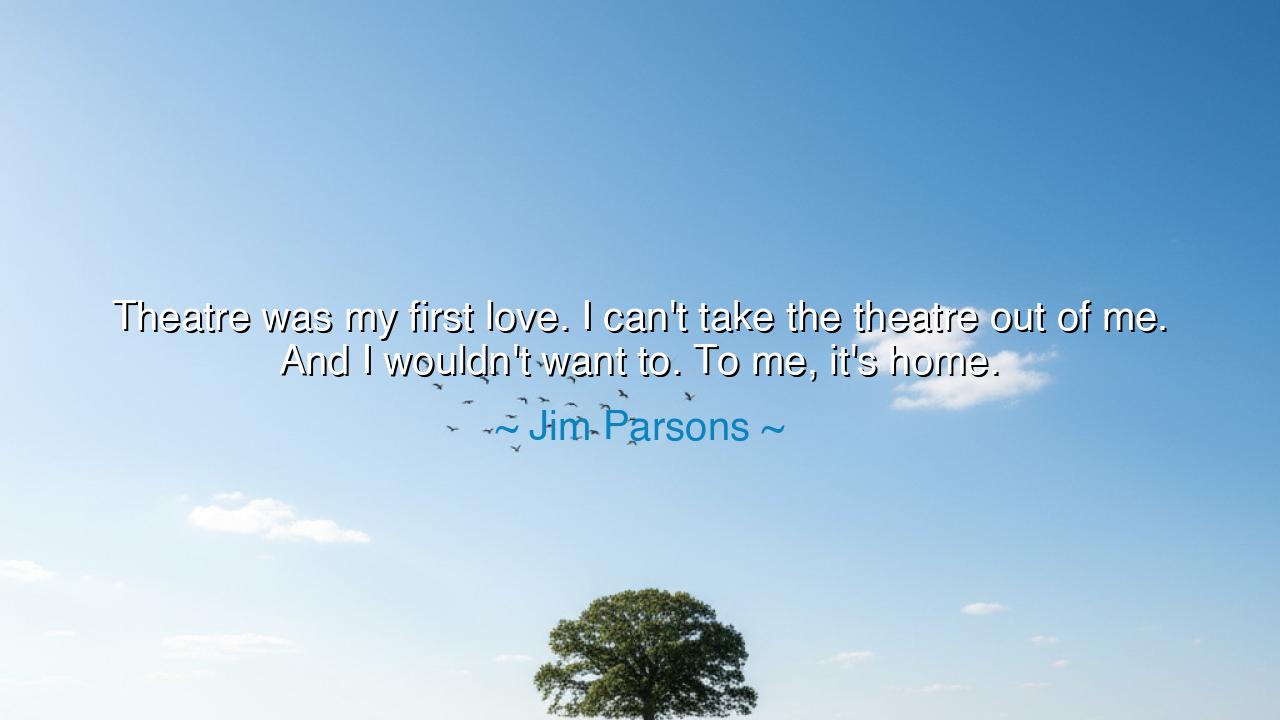
Theatre was my first love. I can't take the theatre out of me.
Theatre was my first love. I can't take the theatre out of me. And I wouldn't want to. To me, it's home.






In the heartfelt and reverent words of Jim Parsons, the actor whose craft bridges intellect and emotion, there beats a truth that echoes through the ages: “Theatre was my first love. I can’t take the theatre out of me. And I wouldn’t want to. To me, it’s home.” In these simple, tender words lies a devotion that surpasses profession; it is the confession of one who has found in art not merely work, but identity, belonging, and the pulse of life itself. It is the voice of a soul who has dwelt among the lights and shadows of the stage and found there the language of the heart—the sacred ground where human truth takes form.
Jim Parsons, known to the world for his brilliance on screen, began his journey not beneath the cameras, but beneath the stage lights. His craft was born not in the rush of fame but in the humble rehearsal halls of the theatre, where actors labor in anonymity to breathe life into words centuries old. The theatre, to him, was not a stepping stone—it was the foundation, the temple. When he speaks of it as home, he reminds us that our truest origins are not erased by success, but deepened by remembrance. No matter how far one wanders, the first love of one’s soul—the thing that first awakened its fire—remains the truest compass.
In ancient times, the theatre was not mere entertainment—it was a mirror of the gods. The Greeks, in the amphitheaters of Athens, gathered under the open sky to witness stories that revealed the human heart in all its frailty and grandeur. Through the tragedies of Sophocles and the comedies of Aristophanes, the people confronted themselves, their joys, their sins, and their destinies. To those actors and poets, the stage was a sacred ground, a communion between man and divinity. And so it remains. When Parsons calls the theatre home, he speaks the same truth that the ancients knew—that art, in its purest form, is not a craft but a calling, not a building but a belonging.
There is an old tale of Sarah Bernhardt, the legendary actress of the nineteenth century. Even when her fame stretched across continents, she would return to the stage night after night, even as her health failed. When asked why she endured such strain, she replied, “Because on the stage, I live more truthfully than anywhere else.” Like Parsons, she understood that the theatre is not simply a place of performance—it is a place where the masks of daily life fall away, and one stands bare, alive, and aflame with truth. The stage is paradox: a place of illusion that reveals reality, a home that exists only in the moment of creation.
Parsons’ words remind us of the profound human need for home—not merely the roof that shelters the body, but the space that shelters the soul. For him, that place is the theatre; for others, it may be the field, the classroom, the canvas, or the workshop. Whatever it is, it is the place where we feel most ourselves, most alive, where the heart speaks in its native tongue. To forget this home is to wander through life unanchored, chasing comfort but finding none. To remember it—to return to it—is to find, even for a moment, peace.
The love of which Parsons speaks is not the fleeting love of passion, but the enduring love of devotion. It is the love that asks for labor, sacrifice, and patience. The theatre demands rehearsal after rehearsal, night after night of repetition, of vulnerability, of facing one’s own limits. And yet, it rewards with transcendence. Such is the nature of all true vocations: they demand everything and return the soul to itself. Parsons’ refusal to “take the theatre out of” him is the mark of one who has accepted this covenant, who knows that one’s first love, once awakened, can never truly be lost.
So, let this be the lesson, O listener: find the thing that feels like home to your spirit, and hold it sacred. Do not abandon it for the applause of the crowd or the ease of comfort. Return to it when the world grows loud, for it will remind you of who you are. And when others misunderstand your devotion—when they see it as folly, obsession, or indulgence—remember that the heart’s home is not built for others to dwell in; it is built for your soul alone.
For as Jim Parsons teaches, to have something you cannot take out of yourself is not a burden—it is a blessing. To live without such a love is to live unrooted; to carry it within you is to carry a light that guides you through every shadow. And when you step upon your own stage, whatever it may be, may you feel as he does: that you have returned not to work, but to home—the place where your truest self was born, and where it forever belongs.






AAdministratorAdministrator
Welcome, honored guests. Please leave a comment, we will respond soon